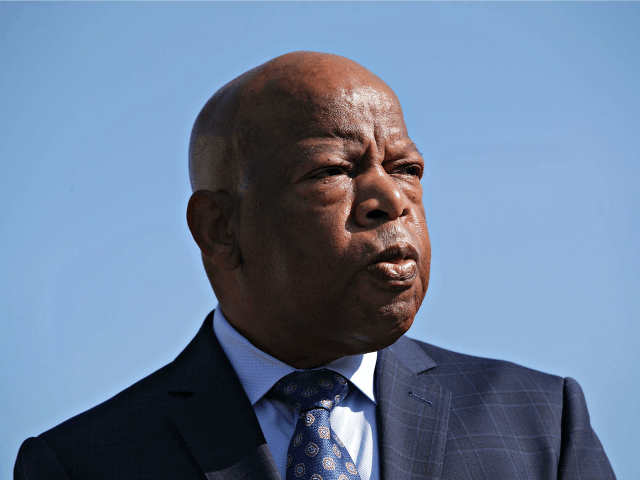Civil Rights Movement icon Rep. John Lewis (D-GA) died Friday night at 80 after a bout with pancreatic cancer.
Lewis, who was intricately involved in the Civil Rights Movement alongside Martin Luther King, Jr. and other leaders of the era, was a key figure in the House Democrat conference.
Lewis was one of the youngest leaders of the Civil Rights movement, as the head of the Student Nonviolent Coordinating Committee (SNCC). During his time as the head of SNCC, Lewis along with the other five so-called “Big Six” Civil Rights Movements leaders–King, the National Urban League’s Whitney Young Jr., labor leader A. Philip Randolph, CORE’s James Farmer Jr., and the NAACP’s Roy Wilkins–organized the March on Washington at which King delivered his historic “I Have a Dream” speech.
Lewis was one of the more aggressive in pursuit of the cause. In 2009, the New Yorker’s David Remnick reported that other Civil Rights movement leaders toned down Lewis’s speech at the March on Washington because they feared it would aggravate then-President John F. Kennedy’s administration. Remnick wrote:
In the original draft of his speech, the demand for racial justice and ‘serious revolution’ was so fearless that, in the last minutes before the program began, Dr. King, Bayard Rustin, Roy Wilkins, and other movement organizers negotiated with him to remove any phrases that might offend the Kennedy Administration. Lewis planned to say, ‘We will march through the South, through the heart of Dixie, the way Sherman did. We shall pursue our own ‘scorched earth’ policy and burn Jim Crow to the ground––nonviolently. We shall fragment the South into a thousand pieces and put them back together in the image of democracy.’ He had to lose the bit about Sherman’s army, but the rest of the text, capped by its final warning—’We will not be patient!’––left no doubt about Lewis or about the audacious generation he represented.
In its obituary on Lewis Friday night, Politico noted that Lewis later said he was upset at first with the edits to his speech but later was satisfied with the result.
“I was angry, but when we were done, I was satisfied,” Lewis later wrote in his book Walking With the Wind.
Lewis was instrumental in many other facets of the Civil Rights Movement in addition to the March on Washington. Politico wrote:
As a teen, Lewis met both Rosa Parks and Rev. Martin Luther King Jr. In 1957, he went to the American Baptist Theological Seminary in Nashville, where he connected with some of the people who would become leading lights of the civil rights movement: Diane Nash, James Bevel, Jim Lawson, Bernard Lafayette and C.T. Vivian. (Vivian died earlier Friday at the age of 95.)
He later joined the first Freedom Riders in the spring of 1961, where he would be assaulted multiple times throughout the south as he and others sought to integrate bus terminals. “Lewis was the first of the riders to be assaulted, during a stop in Rock Hill, S.C. He was punched and kicked. Lewis would be assaulted again in Montgomery, Ala., where he was knocked unconscious.”
Politico also noted that Lewis was there for and participated in several key moments of the Civil Rights Movement in the 20th century:
As a leader of the Student Nonviolent Coordinating Committee, Lewis was a committed participant in some of the key moments of the movement — an original Freedom Rider in 1961, a principal speaker at the March on Washington in 1963, one of those brutally clubbed during a 1965 march in Selma, Ala.,” Politico wrote. “Through it all, he faced taunts, beatings and dozens of arrests.
Lewis was later, in 1986, elected to the U.S. House of Representatives. He served until his death on Friday night, for more than 30 years.

COMMENTS
Please let us know if you're having issues with commenting.